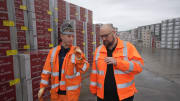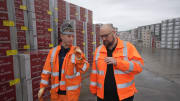As part of a
three-year partnership programme with support from Marshalls,
UNICEF has carried out much needed research in the quarrying industry in India.
The business case for improving children’s rights is simple for us. Marshalls is fundamentally committed to leveraging sustainability to drive competitive advantage. As such, we made a public commitment as a
United Nations Global Compact signatory in 2009 to uphold the human rights of all, including children, many of whom are some of society’s most vulnerable members.
What began over 10 years ago as a goal to ensure the absence of child labour in our own supply chain and to eradicate child labour in the wider stone sector in India, has led to a deepening understanding of the wider issue of children’s rights, and more knowledgeable and extensive engagement through which we are now seeking long-term systemic change for children.
This objective has required dogged persistence, a fair amount of punching above our weight, and direct communication with a wide range of stakeholders including our employees, suppliers, non-governmental organisations, quarrying communities, quarry owners, customers, and local and national governments.
It is a journey which has seen the stone sector in denial and where we at first experienced ferocious resistance from quarry owners in India. We then had to address complex issues such as access to education, the fundamental questions surrounding a living wage for workers, and the close link between children’s rights and women’s empowerment. The process has been underpinned by an absolute commitment to sustainable business practice.
As the quarrying industry is hazardous, the dangers to children in any quarrying supply chain are clear. But perhaps the broader impacts of the quarrying industry on children are less obvious: the poor health of women in rural quarrying communities affecting their ability to take care of children, the ordeal of families migrating to engage in mine work to escape poverty, the erosion of family and social structures, the difficulty of living as displaced, homeless or in poor living conditions, the lack of access to education, the absence of child protection systems, the prevalence of child malnutrition, hunger and food insecurity, the increase in morbidity, the lack of access to health care, the exposure to HIV/Aids, the contamination of water, soil and air, and the exposure to exploitation and abuse. These conditions, and more, potentially have a disproportionate impact upon children.
Much of our initial work involved streamlining our supply chain and working closely with our sole supplier in India to implement the Ethical Trading Initiative base code. Alongside this, we developed a long-term partnership with a local non-governmental partner in Kota, India to deliver child education, health camps, workers’ rights education and social security insurance provision.
Our engagement with Unicef in early 2012 deepened the process of engaging in support of children’s rights and has added value in numerous ways. Our involvement in the development of the Children’s Rights and Business Principles framework through Unicef’s pilot programme enabled us to develop our knowledge and approach, and to communicate them to our supply chain and other key stakeholders. Our first Children’s Rights and Business Principles audit in 2012 gave us the framework to map our progress and identify the most pressing areas for future activity.
An important part of this process has been to develop our policies regarding the rights of children. Our human rights, children’s rights and child labour policy statements make our stance clear. We are particularly excited to be increasing our engagement and consultation process with children and young people in the UK and overseas as stakeholders in their own right.
As part of a three-year partnership programme with support from Marshalls, Unicef has carried out much needed research in the quarrying industry in the Indian state of Rajasthan. Unicef will use the findings to develop long-term interventions to tackle child labour in the stone quarrying sector. The research findings will be used during 2015 to support the Indian government, business and other stakeholders in adapting policies and creating a regulatory framework to eliminate child labour in the quarrying industry.
This partnership also supports Unicef’s child protection interventions and education programmes in India, China and Vietnam. Marshalls is extremely engaged in this process. While bringing market knowledge and expertise, the company is eager and open to learn from Unicef. It is a true hands-on partnership which reflects all that this kind of engagement entails from both organisations.
The hope is that when our business looks back on activity 50 years from now, it will judge that we made good, sustainable choices which have secured our market-leading position and set us apart in terms of our ethical, responsible and pioneering corporate behaviour. At the forefront of this, I hope, will be our approach to children’s rights and business principles
By Chris Harrop, Group Marketing Director responsible for sustainability at Marshalls.
Follow
@MarshallsChris &
@MarshallsGroup for updates on Marshalls' work with Unicef.
































































































